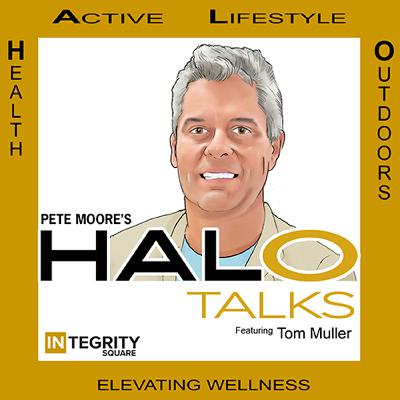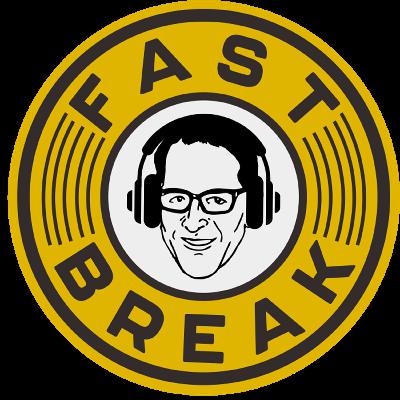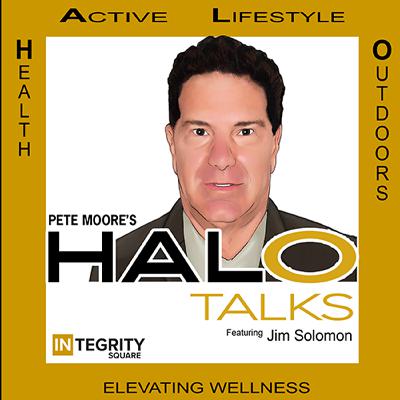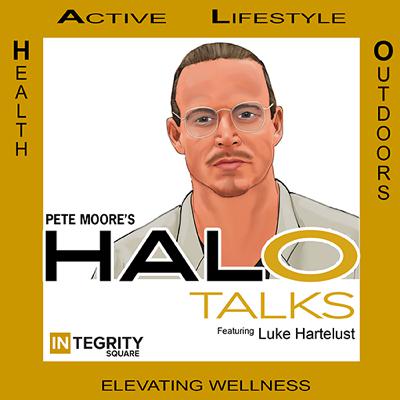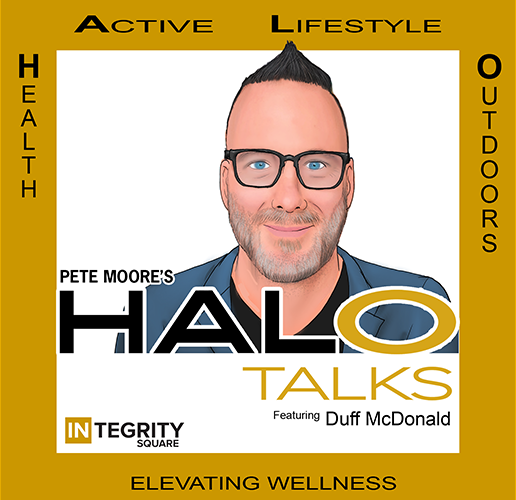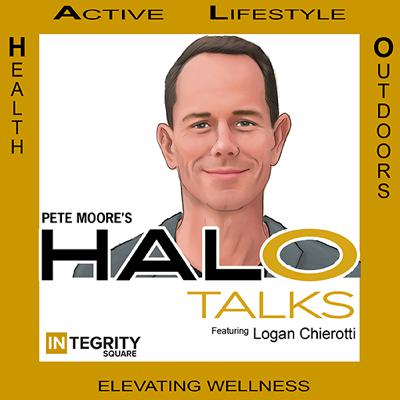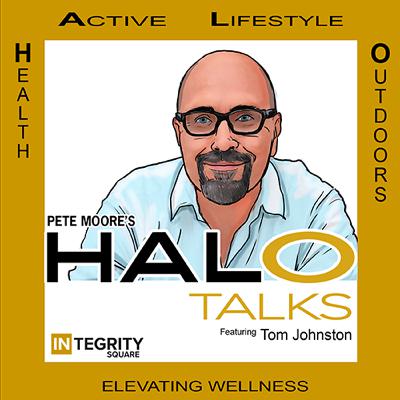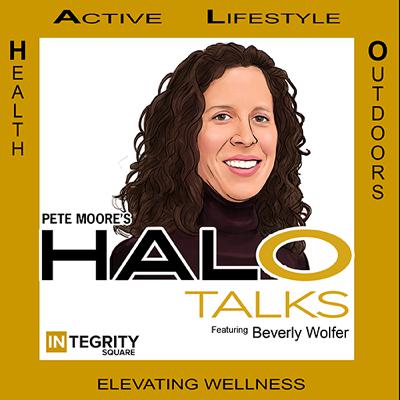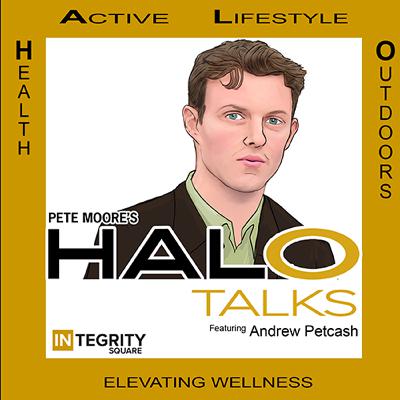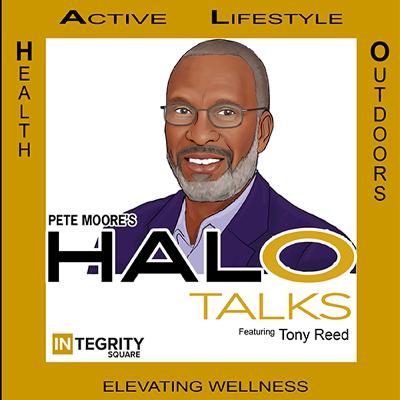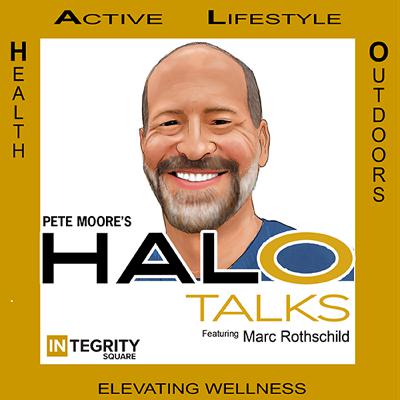Discover HALO Talks: Elevating Wellness
HALO Talks: Elevating Wellness

HALO Talks: Elevating Wellness
Author: Pete Moore
Subscribed: 9Played: 416Subscribe
Share
© Integrity Square-2025
Description
Learn from top entrepreneurs and seasoned business owners in the HALO (Health, Active Lifestyle, Outdoor) sector how to optimize your business success. With host Pete Moore, Founder and Managing Partner of Integrity Square.
585 Episodes
Reverse
In this episode of HALO Talks, host Pete Moore sits down with long-time friend and industry veteran Tom Muller, owner of Elevate Fitness in Syracuse, NY. With roots that stretch back to the Gold's Gym days, Tom shares his journey through decades of shifting trends, club expansions, and the pivotal decision to rebrand and tech-enable his business for the modern member experience. From innovative fitness programming and thriving tennis and swim programs to the impact of major local investments like Micron and Amazon, Tom reveals the strategies that have kept Elevate thriving in a stable, but fiercely competitive market. Tom has always focused on building strong programming for his clubs. Under his guidance, both locations have developed powerful personal training programs and dynamic group exercise offerings. Group X classes, including yoga and Pilates, are a highlight, and Tom even launched a dedicated Pilates studio for reformer sessions. As fitness trends changed, he also transitioned away from spinning classes, transforming that area into a personal training studio and expanding turf areas. Whether you're a fitness entrepreneur, club owner, or just passionate about the HALO sector, you'll find plenty of actionable insights in what Tom has gone through. Stay tuned for a deep dive into leadership, community, and the evolving future of fitness in Upstate New York! Regarding keeping clubs relevant Muller states, "I think we've done a decent job of keeping our capex up, staying relevant, and having the clubs new. I mean they're built in the 70's! And I don't think when you walked in you probably didn't think you were going back in the 70's." Key themes discussed Club evolution and facility repurposing. Strength training's resurgence in fitness trends. Member-focused tech and software upgrades. Layered memberships and revenue strategies. Impact of local economic developments (Micron, Amazon.) Tennis and swim programming excellence. Real estate ownership and long-term club investment. A Few Key Takeaways: 1. Club Evolution & Adaptability: Tom shares his story from Gold's Gym to Elevate and explains how adapting the club's facilities (converting tennis and racquetball courts to new amenities, etc) has been key to staying current with industry trends and maintaining relevance in the community. 2. Focus on Programming & Membership Layers: A strong emphasis is placed on diverse programming: Personal training, Group X classes, Pilates, yoga, and more. Tom also highlights the move to layered memberships, allowing for upselling and greater value for members, especially through services like recovery centers. 3. Leveraging Technology: Switching to an integrated platform like Zenoti streamlined operations, combined all member-facing tech under one roof, and has allowed Tom and his team to better track member behavior, manage layered memberships, offer targeted promotions, and drive revenue more efficiently. 4. Real Estate Ownership as a Strategic Advantage: Owning the club real estate provides flexibility for ongoing capital improvements. Muller underscores how continuous investment in capex helps keep the clubs up-to-date and competitive, especially crucial in a stable but slowly evolving market like Syracuse. 5: Strength in Tennis, Swimming, and Community Roots: Tom mentioned that tennis and swim programming are extremely stable parts of the business, with strong staff and high-quality instruction leading to waiting lists despite competition. Tom's approach is to "grow where you're planted," mastering the local market and building deep community ties rather than spreading too thin or constantly pursuing greener pastures. Resources: Tom Muller: https://www.linkedin.com/in/tom-muller-elevate-fitness Elevate Fitness: https://www.elevatesyracuse.com Integrity Square: https://www.integritysq.com Prospect Wizard: https://www.theprospectwizard.com Promotion Vault: https://www.promotionvault.com HigherDose: https://www.higherdose.com
Excited to share highlights from this week's HALO Talks FastBreak featuring Kaitlin Miller from Court Kings. A level 5 player herself, Kaitlin and Pete dive deep into the rapid growth of pickleball and how Court Kings innovative court solutions are shaping the industry—especially for health and fitness facilities. 3 key takeaways: Booming Demand: Pickleball courts in NYC (especially at Life Time Inc.) are booked solid from open to close—sometimes with waitlists to join! If your facility hasn't added pickleball yet, now is the time. Turnkey Court Solutions: Court Kings was recently named the preferred court builder for USA Pickleball and offers end-to-end services from consulting and court surfacing to fencing, nets, and soundproofing—making it easy for facility owners to get started. Fast Installation: With proper planning, facilities can have new courts installed in as little as 2–4 weeks. Early communication (with the General Contractor especially) and material ordering are key to a smooth rollout. If you're considering adding pickleball to your location, listen now for fresh industry insights and practical advice on possible next steps. Also? If you missed it, we have an entire pickleball category playlist on HALO Talks. Check that out here: https://www.halotalks.com/category/podcasts/pickleball/ Contact Kaitlin directly for more information: kaitlin@courtkings.com Resources: Kaitlin Miller: https://www.linkedin.com/in/kaitlin-miller-40a354a3/ Court Kings: https://courtkings.com/ Prospect Wizard: http://www.theprospectwizard.com Promotion Vault: http://www.promotionvault.com HigherDose: http://www.higherdose.com Connect With Us: Instagram: https://www.instagram.com/thehaloadvisors/?hl=en Facebook: https://www.facebook.com/Integritysquare YouTube: https://www.youtube.com/@halotalks LinkedIn: https://www.linkedin.com/company/integrity-square/ Website: https://www.halotalks.com
Welcome to another episode of HALO Talks! In today's episode, Integrity Square Founder and host Pete Moore sits down with Steve Marchese, the founder of LightStim, to dig into the transformative power of LED light technology and its growing role in med spas and wellness centers across the country. Steve shares the LightStim origin story, which was born out of a personal mission to help his own son combat dangerously high blood pressure when traditional medicine offered no solutions. What started as a family "Hail Mary" turned into years of rigorous innovation, FDA collaboration, and breakthroughs in the science of light therapy. The conversation touches on how LightStim developed from handheld devices for skincare to pioneering full-body LED beds, navigating ongoing regulatory controversies of LED and red light therapy, and the persistence needed to create products that truly deliver results. After a few years, Steve saw an opportunity to expand, developing adjustable facial panels for the professional market. This new direction quickly gained traction, and soon, his company was supplying advanced skincare technology to nearly 50,000 spas, med spas, and doctors' offices across the country. Pete and Steve discuss not only the science and technology "backbone" of the products, but also the entrepreneurial journey, the realities of protecting intellectual property, and the future of wellness tech in the HALO sector. Plus, Steve relays a very cool story about how LightStim helped NFL star Saquon Barkley make an unlikely comeback. (Just one example of the real-world results this technology can achieve!) When they made the decision to build an LED bed, Steve states, "There really weren't any beds on the market at that time. We didn't know what it would do, but it was kind of our Hail Mary. The bed ended up taking us six years working directly with the FDA and millions of dollars to actually perfect it before we put it on the market." Key themes discussed Development and innovation of LED light therapy beds. FDA clearance and regulatory challenges for medical devices. Family-run business and entrepreneurial journey. Scientific explanations: ATP and nitric oxide impacts. Industry competition and copycat products. Legal risks and class action lawsuits. Med spa and HALO sector expansion. A Few Key Takeaways: 1. Persistence in Innovation Leads to Breakthroughs: Steve shared the challenges of developing LightStim—what began with handheld LED devices for wrinkles, acne, and pain, evolved into a full-body LED bed. The driving force was personal: Helping his son with dangerously high blood pressure when traditional medicine couldn't. This persistence, trial and error, and working closely with the FDA led to a patented technology that now serves both home consumers and professionals in 50,000+ locations. 2. Understanding Science Behind Red Light Therapy: The effectiveness of their LED bed wasn't mere luck. Initially Steve thought the improvement was due to increased ATP production in mitochondria. Later, with input from Dr. Nathan Bryan, he realized the real impact was in the release of nitric oxide, which relaxes blood vessels and lowers blood pressure. 3. Navigating Regulatory and Legal Landscapes: Getting FDA "clearance" (not "approval"—that's for drugs), especially for a full-body device, is an extremely rigorous process requiring through technical testing and proof of efficacy. Steve explained (some of the many) specific FDA requirements that go into this, such as needing to heat the whole body to the right temperature. Few competitors can actually demonstrate passing these tests, despite what they claim, and the Federal Trade Commission (FTC) is now aggressively policing unsubstantiated wellness claims. 4. Dealing with Competition and Copycats: When asked how he handles rivals with copycat products, Marchese emphasized focusing on building a trustworthy brand and continuing to innovate, rather than spending resources on chasing down every infringer. He pointed out that regulatory and legal scrutiny (from both the FTC and class action law firms) is also helping to weed out companies making unsupported claims. 5. Growth and Family-First Business Approach: LightStim is a classic case of a family-run business that managed to scale. Steve mentioned his wife runs the company as President and his son is now COO—showing a strong family dynamic and a personal connection to the business's mission. The company supports large-scale franchise partners and offers both purchase and leasing options for its products. Resources: Steve Marchese: https://www.linkedin.com/in/steve-marchese-04168472 LightStim: https://lightstim.com/ Integrity Square: https://www.integritysq.com Prospect Wizard: https://www.theprospectwizard.com Promotion Vault: https://www.promotionvault.com HigherDose: https://www.higherdose.com
Welcome to HALO Talks, where we dive into the entrepreneurial journeys and strategic insights shaping the HALO sector! (Health, Active Lifestyle, Outdoors.) In this episode, host Pete Moore sits down with longtime friend and industry veteran Jim Solomon, founder of Hone Fitness. Broadcasting on location from Toronto, Jim shares his story of more than 26 years in the fitness space, from his early days as a senior associate at Gold's Gym to building and selling clubs in Toronto's unique urban neighborhoods. They talk candidly about the "puzzle" that is site selection in metropolitan cities, the evolution and simplicity of the Hone Fitness brand, and the importance of understanding real estate and local culture to create lasting success. Jim and Pete reflect on decades of fitness industry experience, discuss lessons learned from mergers, acquisitions, and private equity partnerships, and reveal how a lean, neighborhood-focused strategy led Hone to thrive in a fast-growing, diverse city. Whether you're an operator, investor, or just passionate about health and fitness, this episode offers valuable perspectives on building resilient businesses—and unlocking growth in ever-changing urban landscapes. When it comes to learning to embrace discomfort while you're growing, Jim states, "When you put your CEO and Founder hat on while you're working for a private equity fund, you go to that fund and say, 'Hey, I'm going to bring you opportunities. None of these opportunities are going to look the same and you're going to have to be comfortable or get comfortable.' That's what we talk about when it comes to neighborhood box traffic flows, density, where things are going and what might be coming. In a gentrifying neighborhood, you gotta get comfortable with being uncomfortable." Key themes discussed Strategic site selection and urban gym growth challenges. Importance of neighborhood-specific approaches in city locations. Differentiating gym brands in competitive markets. Role of simplicity in gym membership models. Private equity influence and acquisition in the fitness industry. Team-building and leveraging immigrant talent. Toronto's unique demographic and public transit's impact on gyms. A Few Key Takeaways: 1. Urban Fitness Expansion Is a Puzzle, Not a Formula: Both Pete and Jim emphasized that successful urban health club development is highly neighborhood-driven, not something simply solved by software or standard models. Detailed, hands-on site selection, walking the neighborhoods, and understanding local demographics are key. As Pete shared, "You gotta live it, really literally live it," underlining the complexity of choosing gym locations. 2. Simplicity Wins in Membership and Operations: Jim built Hone Fitness on the principle of keeping things simple—no hidden fees, straightforward pricing, and easy-to-understand memberships. This allows for a better customer experience, less conflicts at the front desk, and high rates of online membership signups. He purposely avoids complexity, saying, "I like it simple. I've always liked it simple at Crunch, Extreme, and now Hone." 3. Neighborhood "Ownership" Drives Success: Hone's strategy is to become a destination for a specific neighborhood rather than trying to match competitors directly. This means taking advantage of each area's unique dynamics and avoiding duplication of offerings that are better served elsewhere, such as group fitness or children's clubs. As Jim explained, "You have to own a neighborhood when you're in a city like Toronto." 4. Young Immigrant Workforce Is a Competitive Advantage: The team at Hone is largely composed of young immigrants who are motivated, industrious, and looking for opportunities they couldn't find at home. Jim noted the importance of this for management and front desk positions, highlighting that their drive and willingness to work hard has been a huge asset for the business. 5. Subway Access Is Critical in Urban Gym Strategy: In Toronto, proximity to major subway lines is a critical factor in site selection. Jim also stressed that gyms on these lines perform well because they match where young, dense populations travel. "Young and Bloor have the two big subway lines—if you're there and not too close to a GoodLife, you'll do well." Resources: Jim Solomon: https://ca.linkedin.com/in/jim-solomon-81187317 Hone Fitness: https://www.honefitness.com/ Integrity Square: https://www.integritysq.com Prospect Wizard: https://www.theprospectwizard.com Promotion Vault: https://www.promotionvault.com HigherDose: https://www.higherdose.com
Welcome to another episode of HALO Talks! Today, host Pete Moore sits down with Luke Hartelust--a dynamic entrepreneur and now the founder of MNLY--who made the leap from the oil and gas rigs off the coast of Australia to California's innovative health tech scene. Luke shares his journey from the grueling world of offshore drilling to launching and scaling fitness businesses, including his instrumental role in bringing F45 Training to Southern California. The conversation dives deep into his latest venture, a groundbreaking men's health platform that uses AI, cutting-edge blood analysis, and custom supplementation to help men take true ownership of their health. Tune in to hear his insights on building community, the power of personalization in wellness, and what it takes to stand out in the rapidly evolving health optimization space. When it comes to the personalized health revolution he states, "Based on your blood work, our model will prescribe specific doses of specific micronutrients, aminos, herbs, extracts and minerals into that custom supplement formula that comes in morning, noon and night packs." Key themes discussed Career transition from oil and gas to health tech. Entrepreneurship journey and lessons learned from failures. F45 Training franchise growth and operational strategies. Brand protection and building strong community engagement. Men's health issues and the need for accountability. Personalized, AI-driven health optimization and supplement plans. Differentiation of in the men's health market. A Few Key Takeaways: 1. From Oil Rigs to Health Tech: Luke shared his path from working shifts on oil rigs to building fitness businesses and eventually moving into health tech. His drive was sparked by a personal epiphany—wanting to create a better life and help others, which led him to become an entrepreneur. 2. Lessons Learned from F45 and Brand Protection: Luke's experience scaling F45 franchises in Southern California gave him a "six-year apprenticeship" in what to do—and what not to do—when building and protecting a brand. A key takeaway: Focus on the emotions your brand evokes and prioritize building a strong community before chasing customer acquisition at scale. 3. Identifying a Gap in Men's Health-Accountability Over Access: After experiencing low energy despite living a healthy lifestyle, Luke discovered his own testosterone was severely low and saw first-hand the ineffectiveness and friction in telehealth for men. He believes the real crisis isn't just health, but accountability and ownership—people need tools and systems that make it easier for them to take proactive control of their well-being. 4. MNLY's Personalized Health Platform-Seamless, AI-Driven, and Fast: MNLY stands apart by integrating AI-powered testing and personalized recommendations to deliver tailored health plans and custom supplement packs. Customers use an at-home blood kit and environmental health assessment, then receive actionable insights and products within days—removing friction points common in traditional telehealth models. 5. Proven Results and a Focus on Efficiency: MNLY's approach delivers results about 50% faster than most competitors, according to Luke, and their pilot data showed significant improvements in markers like testosterone (on average, a 30% increase in 90 days among test users). Their evolving concierge model combines AI-driven support with human coaching, aiming to streamline the path to better health for busy men. Resources: Luke Hartelust: https://www.linkedin.com/in/luke-hartelust-597332253 MNLY: https://www.getmnly.com Integrity Square: https://www.integritysq.com Prospect Wizard: https://www.theprospectwizard.com Promotion Vault: http://www.promotionvault.com HigherDose: http://www.higherdose.com
Welcome to HALO Talks! In today's episode, host Pete Moore sits down with Rick Dennis, Co-Founder of Bakersfield's Body Xchange and a definite "OG" in the HALO sector. With over 30 years of experience—including a storied career at Family Fitness, 24 Hour Fitness, and launching successful clubs with longtime partner John Ovanessian—Rick shares insights on evolving gym models, member experience, and responding to changing trends. Rick and Pete chat about how Body Xchange became a place "where everybody trains," adapting to the post-COVID demand for more strength training, flexible facilities, and self-guided workouts. Rick opens up about the importance of listening to your local community, running a tight operation with zero leverage, and the unique advantages of local ownership in a burgeoning market like Bakersfield, CA. Pete and Rick also chat about future growth—both for Body Xchange and the Bakersfield area itself—as well as reflections on how today's athletes are changing the game in high school sports and beyond. Listen now for a conversation packed with industry wisdom and practical takeaways for fitness professionals (and enthusiasts!) On the "power" of staying debt-free Dennis states, "We're definitely not a leveraged company. I think that's something that's really important to understand because as you mentioned, with 24 Hour Fitness, once you get leveraged then there's restrictions to that. We've never had those kinds of restrictions because of the foundation and how we built it." Key themes discussed Evolution of Body Xchange and their club model. Shift toward strength training post-COVID. Local market dynamics and growth in Bakersfield. Importance of a debt-free, reinvestment-focused business. Personal touch of local ownership versus national chains. Future expansion opportunities in nearby cities. A Few Key Takeaways: 1. Evolution of Member Experience & Strength Focus: Rick highlighted how their business model has shifted post-COVID, with a significant pivot towards strength training and member-driven use of space. Recognizing the growing interest in free weights and Olympic lifting, they repurposed areas like group fitness rooms to fit more strength equipment, reflecting the changing fitness trends among younger demographics. 2. Deep Local Roots & Smart Growth: The Bakersfield market is robust and expanding, with affordable housing attracting a young population. Rick emphasized how their deep local knowledge allows them to strategically backfill old locations and position themselves in growth corridors, staying ahead of national chains and big box gyms. 3. Debt-Free, Locally-Owned, and Well-Maintained Clubs: Rick and John built Body Xchange with a focus on being debt-free and maintaining strong local ownership. This approach means they can swiftly reinvest in facilities, ensure equipment is always up to par, and maintain a high-touch presence—reasons why members prefer their facilities over less locally involved national chains. 4. Adaptable Operational Strategy: Body Xchange made a post-COVID decision to pause personal training, acknowledging a shift toward self-guided, technology-driven workouts. Rick notes they still onboard members and provide guidance, and could easily reboot personal training if the right talent emerges. 5. Expansion Opportunities & Local Demographics: Looking ahead, Rick sees potential for 2–3 more locations within Bakersfield and more expansion into comparable communities like Palmdale and Lancaster, as well as midsized cities between Bakersfield and Fresno or west along the Central Coast. He stressed their ability to replicate the Body Xchange DNA by maintaining control over real estate and ensuring each new club matches the model's culture and values. Resources: Rick Dennis: https://www.linkedin.com/in/rick-dennis-795252175/ Body Xchange: https://www.bxfitness.com Integrity Square: https://www.integritysq.com Prospect Wizard: https://www.theprospectwizard.com Promotion Vault: http://www.promotionvault.com HigherDose: http://www.higherdose.com
Welcome to another episode of HALO Talks! Today, host Pete Moore sits down with Duff McDonald, former investment banker and well known business journalist, for a fantastic chat. Duff, whose career has spanned investment banking, business journalism, and bestselling books like "The Golden Passport" and "Tickled," shares insights on how numbers and data have come to dominate our understanding of business and life—but why they often fail to capture what really matters. In this episode, you'll hear Duff break down the difference between "experts" and "specialists," challenge conventional thinking on metrics, and advocate for living—and doing business—in the present. Pete and Duff explore why true connection, presence, and awareness can lead to better decisions, stronger relationships, and more meaningful work, especially in the world of health clubs and other verticals in the HALO sector. Whether you're an entrepreneur, leader, or simply curious about finding more joy and meaning in your day-to-day, this conversation will invite you to rethink how you measure success and what it means to build something that truly "tickles" you. When we talk about coming "full circle," Duff definitely can relate. He says, "I worked at Goldman Sachs for two years. I was an investment banker in their analyst program, left that and went into business journalism and spent 20 years as a magazine writer, left that and sort of stopped doing so much magazine writing when the Internet kind of destroyed the economics of print, and weirdly, ironically, ended up writing books after that!" Key themes discussed Numbers vs. Essence: Counting doesn't capture true meaning or human experience. Specialists vs. Experts: Doing is valued over analyzing and predicting. Relationships Over Metrics: Human connection outweighs numerical data in business. Entrepreneurship Mindset: Focus on purpose, not just growth or financial results. COVID Reflections: The pandemic brought unexpected personal growth and realizations. Recruiting and Team Building: Seek people driven by passion and engagement. A Few Key Takeaways: 1. Numbers Don't Capture the Whole Story: McDonald challenges the idea that, "if you have the numbers, you have the story." Having spent years in business banking and journalism, he realized that while numbers can track growth or comparison, they can't really grasp the true essence of a business. Counting and data analysis are certainly valuable, but they're just one dimension—true meaning often lies elsewhere. 2. The Power of Presence Over Metrics: The most impactful moments in life and business happen when you're fully present in the moment—not distracted by the past or anxiously projecting into the future. Duff relates how, during the pandemic, his own mindset shifted to appreciating the "now," leading to more genuine experiences and better decision-making. This is a reminder that being present—not just monitoring KPIs or quarterly numbers—can actually produce the strongest connections and best results. 3. The Difference Between Experts and Specialists: Duff makes a subtle but powerful distinction: Experts count, analyze, and predict; specialists do, master, and experience. (Read that again!) Real business insight (and life satisfaction) often comes from those with hands-on expertise—the "specialists"—rather than just those who look at or talk about the data. For example, if you're sick, you want the infectious disease specialist, not just the epidemiologist with numbers. 4. Human Connection and Authenticity Trump Data for Retention: Specifically for health clubs and service businesses, Duff and Pete agree that relationships are everything. Customer retention and loyalty aren't driven by clever data models, but by staff who are present, ask questions, and genuinely care. Looking people in the eye, building trust, and creating a real bond is more effective (and fulfilling) than merely simply tracking attrition rates or conversion numbers. 5. Find What "Tickles" You—and Others: Duff's philosophy, as explored in "Tickled," is about seeking out what genuinely excites and engages you. When people are truly passionate ("tickled" by what they're doing), their energy is palpable and contagious—whether in recruiting, management, or customer interactions. Asking "What are you passionate about?" or "What tickles you?" leads to deeper, more meaningful relationships, both personally and professionally. Resources: Duff McDonald: https://theduffproject.com/ Duff McDonald LinkedIn: https://www.linkedin.com/in/duff-mcdonald-076a8664 Duff's Books: https://www.amazon.com/stores/Duff-McDonald/author/B001K8NXAU Integrity Square: https://www.integritysq.com Prospect Wizard: https://www.theprospectwizard.com Promotion Vault: http://www.promotionvault.com HigherDose: http://www.higherdose.com
On this episode of HALO Talks, host Pete Moore sits down with Logan Chierotti, founder of Physician's Choice supplements, to dig into the in's and out's of building a high-growth company in the HALO space. Logan discusses his journey from working in digital marketing to launching what is now the top probiotic brand on Amazon, with annual revenues approaching $250 million. He opens up about the importance of focusing on value and science-backed products, the challenges of navigating both e-com and retail distribution, and the lessons learned in building a top-tier executive team. Whether you're a health club operator considering selling supplements or an entrepreneur looking for growth tips, you'll want to hear Logan's takeaways on company culture, self-awareness, and long-term success in a rapidly evolving, highly-competitive space. When it comes to educating customers beyond just price, Logan states, "We wanted to give consumers value. And what's nice is with the Internet or e-commerce or even . . . med spas or health clubs, is you can educate the consumer more, right? They come into your store or they come online and you have all the marketing there so you can really educate them as opposed to just dropping your product in Walmart, which is a pure brand or commodity game. People are buying there based on price or based on packaging, versus when you control the distribution channels, you can educate them a lot more." Key themes discussed Transition from e-commerce to retail distribution strategies. Building a high-quality executive and leadership team. Navigating retailer partnerships and managing risk. Importance of a singular brand focus: Probiotics and gut health. Educating versus marketing to the consumer. Value and growth of subscription business models. Founder self-awareness and letting go of ego. A Few Key Takeaways: 1. Hyper-Growth Through Strategic Focus: Logan shared how Physician's Choice grew quickly by narrowing their initial focus to just probiotics and gut health. Rather than trying to be everything to everyone, they became the top probiotic brand by focusing on a science-backed, in-demand supplement. 2. Controlling Distribution—Don't Chase Every Retailer: Logan emphasized the importance of controlling your own distribution channels, especially in the early stages. He cautioned against being seduced by "sexy" big box retail deals, which often shift risk onto the product provider and can become a logistical and financial nightmare. Physician's Choice only says yes to retailers who agree to their terms. 3. Value-Driven Brand Built on Education: The brand positioned itself as a value brand—affordable, yet backed by science and trust in the name. They focused on educating consumers through controlled channels like e-commerce and social media rather than relying on traditional retail, where purchasing decisions are much more driven by price and packaging. 4. Building a Strong Executive Team: Chierotti's biggest learning was recognizing his own strengths and weaknesses early. He surrounded himself with a high-level executive team, brought in a CEO when the company reached a certain size, and freely gave equity to key hires. He stressed that hiring smart people and getting out of their way was crucial to scaling up. 5. The Power and Patience of the Subscription Model: About 40-50% of Physician's Choice revenue comes from subscriptions—compounded over years. Logan pointed out how businesses (health clubs, supplement companies, etc.) often underestimate how long and compounding subscription revenue can take to build, but if you stick with it and focus on customer retention, the growth will come. Resources: Logan Chierotti: https://www.linkedin.com/in/loganchierotti Physician's Choice: https://www.physicianschoice.com Integrity Square: https://www.integritysq.com Prospect Wizard: https://www.theprospectwizard.com Promotion Vault: http://www.promotionvault.com HigherDose: http://www.higherdose.com
In today's episode, host Pete Moore sits down with returning guest Jason Moore, CEO and founder of Spren (formerly Elite HRV.) Jason shares the journey of his company's cutting-edge technology, which transforms any smartphone into an advanced biomarker and body composition analysis tool. With over a million users and thousands of coaches trained, Spren's platform is accelerating how gyms, coaches, and fitness enthusiasts track results and stay motivated. Pete and Jason dive into the evolution of Spren's technology, lessons learned from the pandemic, and how partnerships with industry leaders like Fitness On Demand are reshaping the member experience across more than a thousand gyms. Jason also pulls back the curtain on the powerful data trends Spren has uncovered, including what truly drives lasting health changes among gym members—and why focusing on muscle may be the key to long-term success. Whether you're a club operator, coach, or just passionate about fitness technology, this episode is a candid look at where health and wellness measurement is headed, how to engage members both inside and outside the gym, and the grit it takes to keep innovating in the HALO sector. In discussions surrounding tech, there's always the question of data. On that Jason states, "Ultimately the member owns their data . . . that's how we think of it. Like you Pete, or whoever's listening, you own your own data, you can delete it all or take it with you. There's a big trend towards data portability." Key themes discussed Evolution of Spren's body composition technology. Integration with Fitness on Demand and gyms. Seamless, phone-based body measurement solutions. Learnings from SDK/API versus turnkey offerings. Role of data and biomarkers in fitness journeys. Member engagement and personalized coaching tools. Trends in gym programming and equipment preferences. 1. Spren's Technological Evolution: Spren has transitioned from a prototype-focused company to delivering a full-fledged, scalable product. Their tech uses just a phone camera to provide accurate body composition analysis comparable to a DEXA scan. Over the last two years, they've moved towards offering turnkey solutions that require no IT or development resources, making implementation easier for fitness operators of all sizes. 2. Strategic Partnerships & Expansion: Spren has formed partnerships with major fitness platforms like Fitness on Demand, enabling rollouts across over a thousand gyms. These collaborations let gyms effortlessly integrate body composition tracking and personalized coaching for members, meeting the growing demand for accountability and measurable wellness outcomes. 3. Market Learnings & Business Model Shift: Jason shared that initially, Spren focused on offering their technology as an SDK/API for other tech teams to integrate. However, long implementation timelines and the complexity of custom integrations led them to shift toward simple, self-contained solutions that appeal directly to operators and members—and the market has responded positively to this shift. 4. Holistic Data & User Experience: Spren not only tracks body fat and muscle composition but also integrates data from blood labs and wearables to provide a more comprehensive view of a member's health. The company emphasizes user privacy and data ownership, and keeps the member in control of their own data, with growing features for research and cross-platform health data portability. 5. Industry Trends and Actionable Insights: One of the biggest insights from Spren's dataset is that consistent gym-goers and those who work with qualified coaches show significantly better health outcomes. Also, members who focus on muscle building and preservation, not just fat loss, enjoy better long-term outcomes. Jason also noted a shift in club operators showing a greater willingness to pay for high-impact technology that enhances retention and member results, acknowledging that wellness tech can be an investment rather than just an expense. Resources: Jason Moore: https://www.linkedin.com/in/thehumanjason Spren: https://www.spren.com Jason's First HALO Talks Episode: https://www.halotalks.com/episode-384-unlocking-biometric-sensing-technology-w-jason-moore-of-spren-elite-hrv Integrity Square: https://www.integritysq.com Prospect Wizard: https://www.theprospectwizard.com Promotion Vault: http://www.promotionvault.com HigherDose: http://www.higherdose.com
On today's episode, host Pete Moore sits down with Cori Myka, founder of Calm Within Adult Swim, to dive into the world of adult swimming—and why it's never too late to learn. Cori shares her personal passion for water, the (often substantial) psychological hurdles adults face when learning to swim, and how her unique Foundations of Change program helps people overcome fear and embrace aquatic confidence. Pete and Cori explore the relatively untapped demand for adult swim instruction, discuss the mental and physical dynamics of learning new skills later in life, and offer insights for health clubs considering specialized swim programming. Whether you're an entrepreneur, a club owner or manager that has access to a pool, or just someone eager to get more comfortable in the water, this episode delivers thoughtful advice, actionable strategies, and a refreshing perspective on aquatics for all ages. On the untapped potential of adult swim programs, Myka states, "That's the piece that I think is an underserved, underutilized component in the swim industry. It's really because there's such a focus on children, which is great, but there are more adults out there than kids." Key themes discussed Overcoming adult fear of swimming. The psychological aspect of learning to swim. Differences between adult and child swim instruction. Opportunities for adult swim programming in clubs. Creating supportive communities for adult learners. Market demand and pricing for adult swim lessons. A Few Key Takeaways: 1.Half of Adults Can't Swim—But They Can Learn: According to Cori, about 50% of adults do not know how to swim. While there's a major focus in the industry on children's swim lessons, the adult market is underserved and much larger than many people realize. Cori's mission is to reach these adults and show that it's never too late to learn. 2. Psychology and Fear Are Major Barriers for Adult Learners: For adults, fear is a significant barrier to learning how to swim—much more so than for kids. Cori's "Foundations of Change" program is tailored to this, focusing two parts on mindset and one part on physical skills. Progress is based on how adults feel in the water, and it typically takes 20–100 hours for an adult to feel comfortable in deep water. 3. Adult Swim Programming Is Underpriced and Undervalued: There's a big revenue opportunity for clubs willing to offer adult swim programming, especially when marketed and priced at a premium—often comparable to or higher than kids' private lessons. These programs can utilize off-peak pool hours, making them a win for both facilities and clients. 4. Online and In-Person Learning Are Both Essential: While some instruction can be done online (breaking down the learning steps and addressing mental blocks), the kinesthetic, in-water experience is irreplaceable. Cori's approach blends these, guiding adults step-by-step without overwhelming them, and leveraging online cohorts or local instructor training to scale the model. 5. Creating a 'Water Culture' Starts with Adults: For families, making swimming a regular part of life is vital to kids' comfort in the water. Cori emphasizes that the main barrier for kids is often parents' own fear or inexperience. Adults who learn to swim not only change their own lives—they open doors for their families and help build a culture where water safety and confidence are the norm. Resources: Cori Myka: https://www.linkedin.com/in/cori-myka-62314a18 Calm Within Adult Swim: https://adultswimlesson.com Orca Swim School: https://orcaswimschool.com/meet-our-staff Integrity Square: https://www.integritysq.com Prospect Wizard: https://www.theprospectwizard.com Promotion Vault: http://www.promotionvault.com HigherDose: http://www.higherdose.com
On today's episode, Founder of Integrity Square and HALO Talks host Pete Moore sits down with longtime friend and Talent Optimizer Group founder, Tom Johnston. They dive deep into the power of talent optimization and why having the right people in the right seats is the ultimate game-changer for HALO (Health, Active Lifestyle, Outdoors) sector businesses. Tom unpacks how health clubs can move beyond traditional hiring practices, bring rigor to their people strategy, and use data-driven insights—like employee engagement surveys and behavioral assessments—to build winning, high-performing teams. From real-world case studies with leaders like Club 16's Trevor Linden to practical advice on boosting employee retention and preparing your business for sale, this episode is packed with actionable strategies to help club owners turn their workforce into a true differentiator. Whether you're scaling up, planning an exit, or just want more engaged employees and less churn, you'll get an inside look at the role of compassionate leadership and systematic talent development. On bridging the gap between 'business strategy' and 'people strategy,' Johnston states, "Most organizations have a business strategy. They know what results they're looking to achieve, but they don't necessarily have a people strategy. There's a discipline around how we go about hiring the right people for the right role, and how we go about retaining talent." Key themes discussed Importance of talent optimization in business strategy. Building and retaining a high-performing team. Role of data and surveys in employee engagement. Value of organizational transparency and action. Impact of employee retention on company valuation. Process of talent acquisition and onboarding. Significance of compassionate leadership for team success. A few key takeaways: 1. Talent Optimization Is a Discipline, Not a Buzzword: Tom emphasizes that talent optimization goes beyond simple recruiting—it's about aligning "business strategy" with a well-thought-out "people strategy." This means intentionally hiring, retaining, and developing employees to match organizational goals, much like building a high-performing sports team. 2. Data-Driven Approaches Improve Employee Engagement: Tom discusses using tools like the Predictive Index to survey and assess team fit, manager-employee relationships, and overall engagement. These surveys, which are anonymous and concise, provide actionable insights leaders can use to improve employee satisfaction and retention. 3. Cultural Fit and Leadership Matter Just as Much as Skills: It's not just about a person's resume ("the briefcase"); hiring should prioritize behavioral fit ("the head") and passion or values alignment ("the heart.") Compassionate leadership and a focus on psychological safety foster a winning, loyal team. 4. Optimizing Talent Directly Impacts the Bottom Line: Tom shares case studies (like Club 16) illustrating how improved organizational structure and engagement have led to multi-million dollar gains. Reducing turnover, maximizing existing payroll, and scalable talent systems translate into real, measurable financial value—especially important when positioning a company for sale. 5. Winning Cultures Are Built on Transparency and Action: Both Pete and Tom stress the need for leaders to be transparent with teams—sharing survey results, explaining the "why" behind changes, and taking meaningful action. This not only helps employees feel seen and valued, but also drives consistent improvement and business success. Resources: Tom Johnston: https://www.linkedin.com/in/thomassjohnston Talent Optimizer Group: https://www.talentoptimizergroup.com Club 16 Case Study: https://talentoptimizergroup.com/case-study Integrity Square: https://www.integritysq.com Prospect Wizard: https://www.theprospectwizard.com Promotion Vault: http://www.promotionvault.com HigherDose: http://www.higherdose.com
On this episode of HALO Talks, host Pete Moore sits down with Larry English—former NFL player, real estate developer, and now the mind behind Mind Body Mastery and the Union Capital Company. Larry opens up about his journey from achieving his childhood dream of playing in the NFL, to facing the tough transition into business and entrepreneurship. He shares the pivotal realization that his champion mindset and focus on health, once honed as a pro athlete, was just as essential in the world of business. Larry talks about the importance of optimizing the "operator behind the business," using a data-driven approach to health and performance that goes far beyond "typical" fitness routines. Learn how a life-changing moment—watching the film "Concussion"—sparked his commitment to longevity and cognitive health, leading him to invest heavily in cutting-edge wellness strategies. Now, Larry helps executives and entrepreneurs unlock their peak potential through personalized, high-accountability programs that blend science, discipline, and mindset. Don't miss this inspiring conversation that proves whether on the field or in the boardroom, true performance starts with taking care of yourself first. You'll gain actionable insights on building sustainable vitality, avoiding burnout, and playing the long game in health and business. On the hidden cost of ignoring your own health as an entrepreneur, English states, "As business people, we don't debate or second guess the fact that we need to know our numbers in our business. We need to know our KPIs . . . we need to watch that P&L like a hawk. We need to know our conversion rates and cost per acquisition, leads, how many leads we're bringing in . . . all these things, right? But then we look at our health and we think that it's supposed to just happen on its own, intuitively, by happenstance? And that's just not the case." Key themes discussed Transition from NFL career to entrepreneurship and business. Importance of health optimization for business performance. Data-driven approach to personal health and performance. Mindset shifts after major career setbacks. Accountability and structure for lasting personal change. Defining success and fulfillment beyond financial achievements. A few key takeaways: 1. The Importance of Optimizing the "Operator" (You!): Larry emphasizes that just like in sports, your personal health and performance as an entrepreneur or business professional are crucial to overall success. He points out that many professionals fail to recognize that a performance mindset and maintaining health are just as important in business as they are in athletics. 2. Lessons from Professional Sports Transition to Business: Larry draws direct parallels between elite athletics and building a business. He discusses how data-driven approaches, discipline, and having a clear playbook are not just for sports, but equally vital for high-performing business leaders. Just as athletes track performance metrics, business leaders should monitor their KPIs—and their health metrics. 3. Facing and Overcoming Burnout: Burnout isn't just a result of overworking. As Larry puts it, "your operating system is busted." After leaving the NFL, Larry learned the hard way that abandoning a health-first mindset led to a decline in vitality and performance—even as he achieved success in real estate. His story illustrates the need to reset and refocus on personal well-being for sustained high achievement. 4. Data-Driven, Holistic Optimization Programs: Larry's program is built on a holistic, science-based approach. It includes training, nutrition, biomarker optimization (via bloodwork), supplementation, and lifestyle supports. Success isn't just about willpower; it's about a system that offers expert guidance, accountability, and customization to each client's needs—so that health goals can directly power professional and personal ones. 5. Seeing Setbacks as Setups for Transformation: One of Larry's most powerful reflections centers on how a major business deal falling through led him to reconsider his true purpose. Rather than letting the setback define him, it pushed him to pursue his passion for helping others optimize their lives. He now uses the lessons—and the systems—that helped him transition from NFL athlete to successful entrepreneur and coach as a blueprint for others who want to "win the war, not just the game." Resources: Larry English: https://www.linkedin.com/in/larryenglishmindbody Mind Body Mastery: https://mindbodymastery.com/training Prospect Wizard: https://www.theprospectwizard.com Promotion Vault: http://www.promotionvault.com HigherDose: http://www.higherdose.com
On this episode of HALO Talks, host Pete Moore sits down with Beverly Wolfer, Executive Director of Tina's Wish, to dive into the critical topic of health literacy and the power of community-driven change. Beverly shares her journey from the world of consulting to the nonprofit sector, where she leads efforts toward early detection of ovarian cancer—a mission inspired by the legacy of Judge Tina Brozman. Pete and Beverly explore how HALO sector leaders (health, active lifestyle, outdoors) can champion women's health through partnership, awareness, and education. Beverly sheds light on the life-saving potential of spreading knowledge about ovarian cancer's subtle symptoms, and explains how Tina's Wish is building a powerful platform—"What to Know Down Below"—to bridge gaps in health literacy and empower women to advocate for themselves. Listeners will also hear Beverly's inspiring perspective on purposeful career pivots, the importance of giving back, and the deep meaning she finds in honoring her brother's legacy through another nonprofit supporting American troops. On 'solving herself' out of a job, she states, "My goal is for us to solve Tina Brozman's dying wish and to find an early detection. And I can't think of a better way to put on my next resume, you know, how to put myself out of a job. Because we solved the problem that we went into solving, right?!" Key themes discussed Health literacy and gynecologic cancer awarenes. Importance of early detection for ovarian cancer. Tina's Wish Foundation mission and impact. Community partnerships and fundraising in fitness spaces. Personal fulfillment in nonprofit career transitions. Honoring veterans and family legacies through service. A few key takeaways: 1. Mission of Tina's Wish-Early Detection for Ovarian Cancer: Tina's Wish was founded in memory of Judge Tina Brozman, who passed away from late-diagnosed ovarian cancer. The foundation's mission is to fund research to develop an early detection screen for ovarian cancer—a test that currently doesn't exist. The foundation has raised $29 million since 2008, fueling innovation and bringing hope closer to reality. 2. The Power of Health Literacy and Community Education: Beverly emphasized the importance of health education, especially about gynecologic cancers and women's health. Her organization's "What to Know Down Below" platform and podcast series empowers women to recognize symptoms and advocate for themselves, literally saving lives through awareness and knowledge. 3. Partnership Opportunities for Health and Fitness Communities: Tina's Wish is seeking collaborations with fitness clubs, yoga studios, and wellness businesses. Ways to get involved include co-branding materials, distributing educational decals (such as in locker room bathrooms), and participating in turnkey fundraising events—making it easy for organizations to support the cause and educate their communities. 4. Running a Nonprofit: Purpose and Professional Fulfillment: Beverly's transition from the corporate world to nonprofit leadership was driven by a desire for purpose. While the daily work still involves tasks like HR and accounting, knowing her efforts are mission-driven makes a profound difference. She shared that her ultimate goal is to "put herself out of a job" by solving the very problem her organization was founded to address. 5. Honoring Personal Legacy and Service: Beyond her role at Tina's Wish, Beverly runs a foundation in memory of her brother, a Jewish American soldier killed in Iraq. Her family focuses on education, awareness, and meaningful care packages for deployed soldiers, highlighting both the personal impact of service and the ongoing need to keep memories and lessons from the past alive. Resources: Beverly Wolfer: https://www.linkedin.com/in/beverly-wolfer-nerenberg-38749467 Tina's Wish: https://tinaswish.org What To Know Down Below podcast: https://tinaswish.org/whattoknow Prospect Wizard: https://www.theprospectwizard.com Promotion Vault: http://www.promotionvault.com HigherDose: http://www.higherdose.com
In this episode, host Pete Moore sits down with Andrew Petcash—former college basketball player, venture capitalist, and one of LinkedIn's most insightful voices on the business of sports. Andrew shares his journey from building a massive NBA YouTube channel as a teenager to founding Profluence Capital, a sports-focused venture fund that connects founders, investors, and cutting-edge sports businesses. The conversation dives deep into Andrew's strategy for breaking down sports industry segments, sourcing valuable market data, and building authentic, action-oriented thought leadership (or, as Pete calls it, "action leadership!") He unpacks how his personal brand has become a powerful engine for attracting investment targets and shares why transparency in the investment process can spark even more opportunities in the ever-evolving sports landscape. Whether you're an entrepreneur, investor, or just interested in youth and collegiate sports—including the ripple effects of NIL—this episode gives you a behind-the-scenes look at how major trends are being identified, funded, and built from the ground up. Petcash also offers candid advice for aspiring investors about the best ways to get involved in early-stage sports deals. On their investment aproach, Petcash states, "Most of our companies have said we're their most helpful investor because we can also get them a lot of attention from our channels from a marketing lens. We also just have a huge network to get them more investment or to get them more customers or whatever." Key themes discussed Building credibility through content and thought leadership. Action-oriented investing in sports and health sectors. Market research and sizing sports investment opportunities. Navigating early-stage venture capital and due diligence. Challenges and opportunities of NIL in college sports. The value of networks and relationships in sports investing. A few key takeaways: 1. Content Creation as a Market Differentiator: Andrew leveraged his expertise in content creation to position himself as not just a thought leader, but an "action leader" in the sports and VC world. By sharing insights and market analysis on platforms like LinkedIn, he built trust, credibility, and created a network effect that brings founders and opportunities directly to him. 2. Unique Approach to Market Sizing and Research: Andrew highlights his process of identifying investment opportunities in sports—especially youth sports and the impact of NIL (Name, Image, Likeness) changes. He combines feedback from industry contacts, exclusive data access, and his own proprietary database, blending qualitative and quantitative insights not widely available elsewhere. 3. Innovative Venture Capital Model: Profluence goes beyond the typical VC approach. They split their portfolio between more predictable, linear investments (e.g., sports teams/events—what he calls "layer one" assets) and higher-upside venture bets. This aims to balance risk and ensure strong fund returns, even if only a few high-risk investments succeed. 4. The Value of Strategic Partnerships and Advisory Networks: Petcash also emphasized the importance of surrounding himself with subject matter experts and private equity partners as both LPs (limited partners) and advisors. This adds significant strategic value when evaluating deals and managing portfolio companies, helping Profluence "punch above its weight" in deal selection and support. 5. Advice to Investors-Use Funds Over Angel Investments: Both Pete and Andrew caution against direct angel investments into early-stage companies, unless you have professional oversight and industry-specific expertise. Instead, they recommend investing through established funds with strong governance and a relevant network—offering better diversification, professional vetting, and an increased chance of success. Resources: Andrew Petcash: https://www.linkedin.com/in/andrewpetcash Profluence Capital: https://capital.profluence.com/team/andrew-petcash Prospect Wizard: https://www.theprospectwizard.com Promotion Vault: http://www.promotionvault.com HigherDose: http://www.higherdose.com
On this episode of HALO Talks, host Pete Moore sits down with Tony Reed—a longtime marathoner, accomplished CPA, grandfather, and passionate advocate for healthier communities. Tony shares his journey that initially began with a childhood diagnosis of pre-diabetes and grew into a lifelong commitment to fitness. He discusses how running not only changed his own life, helping him avoid diabetes, and chronic disease, but also inspired him to support others, particularly within the African American community, through education and community-building. Tony details the beginning of the National Black Marathoners Association, the myths they aim to dispel, and the training and sustainability programs they've launched over the past 20 years. He also talked about the organization's impact—including producing documentaries and creating a nationwide network of running clubs—and offers solid advice for anyone looking to balance a demanding career with a purpose-driven mission. Whether you're a runner, a club owner, or an advocate for healthier, more inclusive communities, Tony's story and insights are absolutely worth your time! When it comes to starting up clubs, Reed states, "We've encouraged our members to get their coaching certifications either through the Roadrunners Club of America or USA Track and Field. Then once they get their certifications, for example, they could partner with a health club, and within that health club, they can actually have a distance running club." Key themes discussed Diabetes prevention and health through running. Overcoming myths about African Americans in distance running. Founding and mission of Black Marathoners Association. Importance of education, training, and sustainability. Partnerships with health clubs and coaches. Inspirational stories and role models in running. A few key takeaways: 1. Personal Health Journey as a Catalyst Tony was pre-diabetic as a child and was told he'd likely need insulin as a teen. Instead, through consistent physical activity, inspired by mandatory sports in school and Dr. Kenneth Cooper's book "Aerobics," Tony committed to a lifelong goal—averaging three miles a day. Decades later, he's run over 51,000 miles and never needed insulin. 2. Turning Personal Motivation into Community Impact Tony's health transformation and running achievements led him to create a formal organization aimed at getting African Americans more involved in distance running. Sparked by community interest when he neared his 50th marathon, he turned his personal discipline into a mission and movement, focusing on education, training, and sustainability. 3. Dispelling Myths and Creating Representation One of the association's core pillars is education: Challenging the myths that African Americans are only sprinters and not suited to distance running. Tony and his organization have produced documentaries to showcase role models and share inspirational stories within the community. 4. Building Partnerships and Running Communities The organization actively encourages members to get certified as running coaches and set up local running clubs—sometimes in partnership with health clubs. They provide role models, resource sharing, and opportunities to affiliate local clubs with the wider movement, enhancing retention and engagement in health clubs by helping members train toward collective race goals. 5. Impact and Legacy Tony's organization is a non-profit with free membership and has directly or indirectly influenced over a quarter million African Americans to get active. Celebrating its 20th anniversary, the association continues to grow, foster community, and provide platforms (like their annual summit) for sharing ideas and expanding their impact. Resources: Tony Reed: https://www.linkedin.com/in/anthonyreedcpa/ National Black Marathoners Association: www.BlackMarathoners.org Prospect Wizard: https://www.theprospectwizard.com Promotion Vault: http://www.promotionvault.com HigherDose: http://www.higherdose.com
Hope you're having a winning week! We're back with this week's 𝘍𝘢𝘴𝘵𝘉𝘳𝘦𝘢𝘬 and today we're focusing on a game-changing question that we get asked a lot at Integrity Square: When is the best time to sell? Here are some things to keep in mind: 🏆 𝗪𝗶𝗻𝗻𝗶𝗻𝗴 𝗗𝗿𝗶𝘃𝗲𝘀 𝗛𝗶𝗴𝗵𝗲𝗿 𝗩𝗮𝗹𝘂𝗮𝘁𝗶𝗼𝗻𝘀 Just like in sports, the HALO space rewards winners. Brands and businesses that consistently outperform, scale effectively, and deliver more value to their members are the ones catching the eye of investors and securing higher valuations. 📈 𝗧𝗶𝗺𝗶𝗻𝗴 𝗶𝘀 𝗘𝘃𝗲𝗿𝘆𝘁𝗵𝗶𝗻𝗴 Are things going well for your business after the challenges of recent years? Now might be the ideal time to think about your exit strategy. Selling when you're on top—when revenues and EBITDA are strong—means you're more likely to get a premium valuation. Don't wait for another downturn when performance and prospects might dip. 🔄 𝗪𝗶𝗻𝗻𝗶𝗻𝗴 𝗖𝘂𝗹𝘁𝘂𝗿𝗲 = 𝗦𝗰𝗮𝗹𝗮𝗯𝗹𝗲 𝗦𝘂𝗰𝗰𝗲𝘀𝘀 The best franchises (in any industry) have a repeatable playbook, a winning culture, and fans who stick around. Whether it's jerseys sold or fitness memberships renewed, sustained excellence sets you apart—and attracts both area developers and investors. 💡𝗣𝗹𝗮𝘆𝗯𝗼𝗼𝗸 𝗳𝗼𝗿 𝗢𝘄𝗻𝗲𝗿𝘀: Build and maintain a culture of consistent achievement. Track your performance, and recognize when you're "winning." If you're considering selling, do it from a position of strength—not as a turnaround. Go HALO! Give us 10 hours of your time at the next HALO Academy starting Sept 8, 2025. Register at https://www.thehaloacademy.com now for $495 and earn a $100 gift card from our friends at Promotion Vault. Testimonials at https://www.thehaloacademy.com/testimonials ====================================================== Thanks to Promotion Vault and HigherDOSE for sponsoring. For 15% off products sitewide (excluding bundles, kits, and full saunas) use the code GOHALO at https://www.higherdose.com
𝗛𝗔𝗟𝗢 𝗔𝗰𝗮𝗱𝗲𝗺𝘆 𝗧𝘄𝗼 𝗠𝗶𝗻𝘂𝘁𝗲 𝗙𝗶𝗻𝗮𝗻𝗰𝗶𝗮𝗹 𝗗𝗿𝗶𝗹𝗹𝘀: 𝗙𝘂𝗻𝗱𝘀 𝗙𝗹𝗼𝘄 𝗖𝗹𝗼𝘀𝗶𝗻𝗴 This week we're finally at the ninth-inning in closing our deal. We've gone through all the prior steps. . . club financials continue to perform and—against all odds (!) —every landlord signed their lease assignments. No last-minute disasters, no drama. (This never happens, but work with me for the sake of illustration. Ha)! 𝗪𝗵𝗮𝘁'𝘀 𝗙𝘂𝗻𝗱𝘀 𝗙𝗹𝗼𝘄, 𝗔𝗻𝘆𝘄𝗮𝘆? All parties expecting cash are listed in a Funds Flow Excel sheet. In this case, $3 million is set aside into an escrow account for two years, ready for any unforeseen surprises. Equipment lenders (like Macrolease) get paid directly by the buyers, ensuring all liens are cleared before ownership fully transfers. Every last closing cost—success fees, accountants, landlord payments—is disbursed. 𝗧𝗵𝗲 𝗩𝗶𝗰𝘁𝗼𝗿𝘆 𝗟𝗮𝗽 With all wires sent and debts cleared, what's left? A classic "tombstone" celebration for the team, and a HUGE sense of accomplishment. These deals take a long time to close. . .anyone who says otherwise is lying (or doesn't truly know the space.) Our shortest deal in the history of ISQ took 60 days. Our longest? About 14 months. Until next week—Go HALO! We go into much more detail in the HALO Academy. Registration open now for our September cohort: https://www.thehaloacademy.com
In today's episode, host Pete Moore sits down with long-time friend and veteran health club entrepreneur, Marc Rothschild. From launching his first gym in 1995 to navigating the evolving landscape of the HALO (Health, Active Lifestyle, Outdoor) space, Marc shares his journey through the industry's highs and lows—including insights gained through decades of club ownership, expansion, and his own, personal transformation. The conversation dives deep into Marc's shift from traditional gym operations to curating meaningful wellness experiences, like his transformative retreat in Costa Rica. Pete and Marc reflect on the power of disconnecting from daily anxiety, reframing self-care, and the importance of creating supportive communities—both inside and outside the gym. Whether you're a fitness professional, club owner, or someone in search of inspiration for your next chapter, this episode is packed with upfront wisdom, real talk about growth, and a look at what it means to both "lead and heal." Key themes discussed Personal growth through fitness and mental health. Evolution from health club operations to wellness retreats. Mindfulness, meditation, and yoga as transformative tools. Importance of community and supportive environments. Embracing discomfort for personal development. Reframing life's hardships into strength and compassion. A few key takeaways: 1. Transformative Power of Retreats and Mindful Experiences: Marc shared how attending a retreat in Costa Rica was a huge turning point for him, both personally and professionally. He mentioned it challenged him physically and mentally, helping him disconnect from daily anxieties and reconnect with nature, mindfulness, and himself. He now feels pulled to curate similar experiences for others, focusing on true transformation rather than just a "typical" vacation. 2. Embracing Discomfort for Personal Growth: Marc emphasized growth comes from getting out of your comfort zone. Whether it's sharing a bungalow with strangers or pushing through physical pain during the retreat, stepping into discomfort allowed him and others to experience real change and build resilience. 3. Entrepreneurial Spirit vs. "Traditional" Employment: Throughout his career—from opening his first gym in 1995, partnering on joint ventures, to his current pursuits—Marc has always been a serial entrepreneur. He reflected on the importance of building a life and work style true to oneself, especially as he's realized he thrives when running his own show versus working for someone else. 4. A Holistic Approach to Fitness, Health, and Recovery: Marc's perspective on health over the years has shifted to a more holistic view. He talked about the importance of integrating modalities like yoga, Tabata, and strength training with mental and emotional well-being, clean nutrition, and recovery. He suggested that feeling your best is about making cumulative positive choices—what you eat, how you move, and how you care for your mind. 5. Community and Connection Versus "Just a Gym": Marc's clubs (like Rock Creek Sports Club) have found success not just by offering fitness classes and equipment, but by fostering real community. They focus on culture, inclusivity, and kindness, attracting and retaining members who want support, encouragement, and genuine connection rather than just your "standard" gym experience. Resources: Marc Rothschild: https://www.linkedin.com/in/marc-rothschild-84a31252 Solluna Yoga Retreats: https://solluna.yoga Prospect Wizard: https://www.theprospectwizard.com Promotion Vault: http://www.promotionvault.com HigherDose: http://www.higherdose.com
In today's 𝗛𝗔𝗟𝗢 𝗧𝗮𝗹𝗸𝘀 𝙁𝙖𝙨𝙩𝘽𝙧𝙚𝙖𝙠 we're excited to bring you another portion of our panel discussion at the recent Athletech News Innovators Summit held in NYC, July 2025. Integrity Square Founder Pete Moore had the pleasure of moderating a panel with Mark Federico (CEO of Crunch Fitness CR Fitness Holdings, LLC) and Terry Blachek (Orangetheory Fitness) for a deep dive into the real-world challenges—and strategies—of scaling fitness franchises. M&A Is More Than Just Numbers: At its core, M&A is (also!) about "multiples and add-backs" 😉—understanding valuation drivers and how projecting future growth (and dealing with the inevitable aftershocks) can make or break a deal. The HALO Sector Has Transformed: Once dominated by just a few big players, the space is now segmented with unique opportunities (and risks) for each vertical. Brands like EoS, Vasa, and Fitness Connection may look new, but actually. . . many are evolutions of legacy Gold's clubs. Valuations: Investor sentiment is extremely strong right now, with leading brands commanding impressive multiples (EoS at 13x, Crunch corporate at 18x.) A diverse club portfolio across states also usually means higher valuation and more investor interest. We encourage everyone to work hard to understand the bigger picture that's literally happening right now in health club M&A—beyond just the financials.💡 Want to learn more? (You should. Otherwise you're playing checkers while the rest of the industry plays chess.) Give us 10 hours of your time at the next HALO Academy starting Sept 8, 2025. Register at https://www.thehaloacademy.com now for $495 and earn a $100 gift card from our friends at Promotion Vault. Testimonials at https://www.thehaloacademy.com/testimonials ====================================================== Thanks to Promotion Vault and HigherDOSE for sponsoring. For 15% off products sitewide (excluding bundles, kits, and full saunas) use the code GOHALO at https://www.higherdose.com






